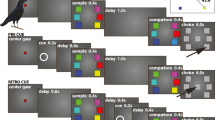Abstract
Evidence of metamemory, the ability to monitor one’s own memory, has been obtained in some primates, but it appears to be weaker in other species. In this study, we examined whether crows flexibly modulate their behavior by monitoring the strength of memory trace in a delayed matching-to-sample task using two paradigms. First, crows performing a memory test were given an escape option to decline taking the test (prospective metamemory). Second, crows were given the escape option as a “not confident” report after completing the test (retrospective metamemory). Accurate memory performance yielded a reward with a higher probability, whereas inaccurate memory performance resulted in no such recompense. The escape option yielded a reward with a lower probability. In the prospective metamemory test, crows escaped the memory test more frequently with longer delay intervals than they did with shorter delay intervals but no more frequently in the sample-omission than the sample-present trials, indicating that the crows decided to take the test or decline it by using the delay interval as a cue. In contrast, in the retrospective metamemory test, the crows escaped the memory test more frequently when their memory-test response was incorrect than correct and more frequently in the sample-omission than the sample-present trials, indicating that the crows recognized confidence regarding their choice in the memory test and utilized the escape option to maximize reward probability. Although these results suggest that crows retrospectively monitor the strength of memory trace, their prospective metamemory ability has not yet been confirmed in the present paradigm.




Similar content being viewed by others
References
Benjamin AS, Bjork RA, Schwartz BL (1998) The mismeasure of memory: when retrieval fluency is misleading as a metamnemonic index. J Exp Psychol General 127:55–68
Emery N (2006) Cognitive ornithology: the evolution of avian intelligence. Phil Trans R Soc B 361:23–43
Emery NJ, Clayton NS (2004) The mentality of crows: convergent evolution of intelligence in corvids and apes. Science 306:1903–1907
Fujita K (2009) Metamemory in tufted capuchin monkeys (Cebus paella). Anim Cogn 12:575–585
Fujita K (2010) Comparative studies of metacognition. Jpn Psychol Rev 53:270–294 (in Japanese)
Goto K, Watanabe S (2009) Visual working memory of jungle crows (Corvus macrorhynchos) in operant delayed matching-to-sample. Jpn Psychol Res 51:122–131
Goto K, Kurashima R, Watanabe S (2010) Delayed matching-to-position in C57BL/6 N mice. Behav Proc 84:591–597
Hampton RR (2001) Rhesus monkeys know when they remember. Proc Natl Acad Sci USA 98:5359–5362
Hampton RR (2009a) Multiple demonstrations of metacognition in nonhumans: converging evidence or multiple mechanisms? Comp Cogn Behav Rev 4:17–28
Hampton RR (2009b) Focusing the uncertainty about nonhuman metacognition. Comp Cogn Behav Rev 4:56–57
Hampton RR, Hampstead BM (2006) Spontaneous behavior of a rhesus monkey (Macaca mulatta) during memory tests suggests memory awareness. Behav Proc. 72:184–189
Inman A, Shettleworth SJ (1999) Detecting metamemory in nonverbal subjects: a test with pigeons. J Exp Psychol Anim Behav Proc 25:389–395
Kornell N, Son LK, Terrace HS (2007) Transfer of metacognitive skills and hint seeking in monkeys. Psychol Sci 18:64–71
Marzruff JM, Angell T (2005) In the company of crows and ravens. Yale University Press, New Haven, CT
Nakamura N, Watanabe S, Betsuyaku T, Fujita K (2011) Do birds (pigeons and bantams) know how confident they are of their perceptual decision? Anim Cogn 14:83–93
Nelson TO, Narens L (1990) Metamemory: a theoretical framework and new findings. In: Bower GH (ed) The psychology of learning and motivation, vol 26. Academic Press, New York, pp 125–173
Smith JD (2009) The study of animal metacognition. Trends Cogn Sci 13:389–395
Smith JD, Shields WE, Schull J, Washburn DA (1997) The uncertain response in humans and animals. Cognition 62:75–97
Smith JD, Shields WE, Allendoerfer KR, Washburn DA (1998) Memory monitoring by animals and humans. J Exp Psychol Gen 127:227–250
Smith JD, Beran MJ, Couchman JJ, Coutinho MVC (2008) The comparative study of metacognition: sharper paradigms, safer inferences. Psychon Bull Rev 15:679–691
Smith JD, Beran MJ, Couchman JJ, Coutinho MVC, Boomer JB (2009) Animal metacognition: problems and prospects. Comp Cogn Behav Rev 4:40–53
Son LK, Kornell N (2005) Metacognitive judgments in rhesus macaques: explicit versus implicit mechanisms. In: Terrace H, Metcalfe J (eds) The missing link in cognition: origins of self-reflective consciousness. Oxford University Press, New York, pp 296–320
Suda-King C (2008) Do orangutans (Pongo pygmaeus) know when they do not remember? Anim Cogn 11:21–42
Sutton JE, Shettleworth SJ (2008) Memory without awareness: pigeons do not show metamemory in delayed matching to sample. J Exp Psychol Anim Behav Proc 34:266–282
Terrace HS, Son LK (2009) Comparative metacognition. Curr Opin Neurobiol 19:67–74
White KG (1985) Characteristics of forgetting functions in delayed matching to sample. J Exp Anal Behav 44:15–34
Acknowledgments
We would like to express our gratitude to Kazuo Fujita, Akio Tanaka, and Alan C. Kamil for their comments and criticisms regarding the manuscript. We also wish to thank Ei-Ichi Izawa for his support in the care and maintenance of the crows in the laboratory. This research was supported in part by a Grant-in-Aid for Scientific Research (#18/5950 and #22700271) from the Japan’s Ministry of Education, Culture, Sports, Science and Technology (MEXT), given to the first author and the Global COE Program (D029) of Keio University.
Author information
Authors and Affiliations
Corresponding author
Electronic supplementary material
Below is the link to the electronic supplementary material.
Rights and permissions
About this article
Cite this article
Goto, K., Watanabe, S. Large-billed crows (Corvus macrorhynchos) have retrospective but not prospective metamemory. Anim Cogn 15, 27–35 (2012). https://doi.org/10.1007/s10071-011-0428-z
Received:
Revised:
Accepted:
Published:
Issue Date:
DOI: https://doi.org/10.1007/s10071-011-0428-z




